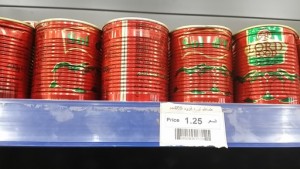By Sami Zaptia.

London, 12 October 2016:
The Eastern-based Interim Government supported by the House of Representatives and headed by Abdullah Thinni announced yesterday through decree no 108 that it is ending food subsidies, according to the eastern-based official LANA state news agency.
| Subsidized price | New retail price | ||
| 1 | Vegetable oil / 1 ltr | 2.147 | 2.50 |
| 2 | Rice / 1 kg | 1.087 | 1.250 |
| 3 | Sugar/ 1kg | 1.087 | 1.250 |
| 4 | Tomato paste / can | 0.652 | 0.750 |
| 5 | Flour / 1 kg | 0.652 | 0.750 |
Source: LANA eastern Libyan government official state news agency
According to LANA, five staple food products have had their prices increased. The price of vegetable oil has been increased to LD 2.50 / litre, a kilo of rice to LD 1.250, a kilo of sugar to LD 1.250, a can of tomato paste to LD 0.750 and a kilo of flour to LD 0.750.
It is not clear why the Thinni government has chosen this particular time to introduce the removal of food subsidies. It had been commonly accepted that removing subsidies would be an unpopular policy measure at a time when Libya was politically unstable and the populous are armed and sensitive.
The Subsidy Stabilization Fund, the official entity that has the budget for the subsidies is based in Tripoli and it is believed that it is no longer receiving funds let alone transferring subsidized goods in adequate volumes to the east of the country.
The eastern Libyan government has claimed that it is not receiving any money from Tripoli and has had to take out a loan from the National Commercial Bank in the east to survive. The removal of food subsidies could have been forced on the eastern administration as a result of the financial difficulties the eastern administration finds itself in.
These subsidized food products are in theory supposed to be distributed through a ration book on a monthly basis through local membership-basis cooperatives. However, in reality the system is widely abused and subsidized goods have for decades leaked into the market price as well is into Libya’s neighbouring countries. Some estimates say as much as a third of subsidized products are smuggled to bordering states.
While cutting food subsidies will make some savings, most of Libyan state subsidies go to electricity, petrol and cooking gas.
The issue of subsidy reform has been a political hot potato for the post 2011 revolution governments. Reform has been avoided with a population that has grown used state-subsidies and the welfare nanny state propagated by the Qaddafi regime.
The widespread availability of weapons and militias and weak state institutions has meant that successive Libyan governments have sidestepped subsidy reform.
In December 2013 the then unified Libyan Minister of Economy had announced that fuel subsidies would be removed within two and a half years.
Prime Minister Ali Zeidan, in July 2013 had announced that it was only smugglers that were prospering from Libyan state subsidies.
Subsidies and price stabilisation costs of LD 11.93 billion were included in the LD 59.95 billion budget which was approved by the General National Congress (GNC) in 2014. Of this LD 7 billion was set aside for fuel subsidies. Petrol in Libya currently sold at LD 0.15/litre. This is more than Libya spends on healthcare.
Hardwired into the 2014 budget is a commitment to substitute the current goods and fuel subsidies for cash subsidies, setting a deadline of 1 January 2015. Article 24 of the budget which sets the deadline stipulates that the reform should be within clear aims that provide social and economic stability.






